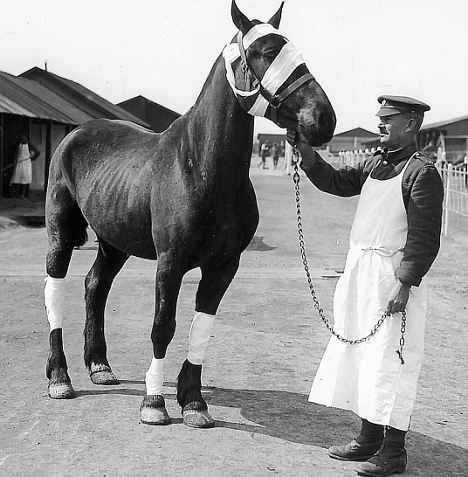Eight million horses and countless mules and donkeys died in the First World War here Alfred Henn talks about his "war horse" Nelson:
Alfred Henn was a driver, in the Warwickshire Royal Horse Artillery, teams of six horses, working in pairs, were needed to pull the heavy guns.
Until his death in 2000, he kept a photograph of the war horse he had cherished as a young soldier. Speaking before he died, at the age of 103, he recalled, 'My horse had lost an eye, so I called him Nelson.'
Nelson's bravery was unflinching. With Alfred riding him, and the full weight of a gun carriage behind him, he galloped directly into the gunfire that was cutting down foot soldiers that were advancing front of them.
'When the infantry had their orders to go over the top, we followed right behind them to take the guns to their next positions. I was absolutely shocked and very angry to see all the countryside scattered with dead bodies.
'I can remember hearing one man shouting, "Shoot me, shoot me, shoot me", and I wondered what on earth was going on. Then he was carried past me - I saw he was lying on a stretcher and his sides had been split open and all his innards were hanging out over the side.
Shocked by the horror of these sights, Alfred had only one confidant - Nelson. And his equine friend had an uncanny sense of danger that served both of them well amid the horror of battle.
Alfred recalled, 'One night, the horses stopped mid-track. They wouldn't walk a straight line, they kept swerving about, and I thought, "What has happened?" We couldn't see anything in the dark, but we'd just walked into an area where a shell had dropped.
There was smoke coming up and the wall was covered in pieces of flesh. It was a terrible sight, I tell you, and the poor horses were more frightened than we were.'
It was a shared terror that was to forge incredible friendships between soldiers and horses. It was a very physical relationship, as they often slept together in the mud to ward off the cold.
But the death toll among the horses was astronomical. Every day, 1,000 were arriving, many shipped in from the US, as new cannon fodder. They were specifically targeted by German gunfire, or died from sheer exhaustion.
Some were so tired that they would slip in the mud and, unable to lift their heads out of the ankle-deep, slimy dirt, would drown. The grim truth was that each soldier knew he could lose his trusted friend at any moment.
Horses were a valuable commodity during World War I , and if a soldier's animal was killed or dropped down dead, he would have to prove to his commanding officer that they hadn't just become separated in the turmoil of battle, so the soldier would have to cut off the horse's hoof to bring back as evidence.


Comments